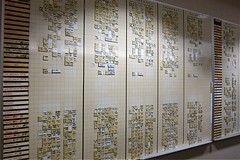
Scheduling Board at Penn State Berks
On November 1, 2011, the Instructional Space Task Force met with the conference of Registrars from Penn State’s campuses.
We facilitated a discussion about instructional space, focusing on three questions:
- What problems have you faced in the past?
- What elements of the current scheduling model work?
- What ought the university’s scheduling priorities be?
After dividing the registrars into small groups of 5 or 6, members of the Task Force facilitated conversations at five separate tables and took collective notes using a Google document. We then had a plenary discussion about the themes that arose from those discussions. Summarized below are some of those themes that emerged for each question. The themes are in rank order of importance under each question.
Problems Faced in the Past
First, the central problem identified was the lack of understanding on the part of various members of the university community, particularly faculty, of the complex set of issues involved with scheduling classrooms and other events. There was some frustration with faculty who were perceived as demanding and inflexible about their classroom and meeting time preferences.
Second, one of the most difficult tasks the schedulers face on the campuses is how to address student needs with limited resources. These limitations varied on different campuses, ranging from an extreme limitation of flexible space, to inadequate parking at peak times of the day.
Third, juggling the needs of individual programs was also expressed as a major difficulty. In particular, addressing the diverse needs of large programs with non-standard requests continues to be a struggle.
Other points that were emphasized included a general lack of space, particularly flexible space and computer labs, non-standard scheduling times between campuses and the limitations of the ISIS scheduling system.
Elements of the Current Model that Work
Although there were far fewer items on this list, the registrars did emphasize that the rollover (or as they refer to it: the lop over) works very well, allowing them to build future schedules based on past schedules. They also really like the ability to schedule events during the holidays and during non-standard times.
At some campuses, there has been strong administrative support for fairness in scheduling. When this happens, it takes the pressure off of the staff, who are often confronted directly by faculty and program coordinators unhappy with a scheduling decision.
The registrars also mentioned that where it is implemented a shared, student centered philosophy of scheduling works well as do standardized scheduling time periods.
Scheduling Priorities
There was general sentiment that the number one priority for scheduling should be student academic progress. The scheduling system should facilitate timely student progress to degree.
The second most important priority concerned space itself. We need more flexible, innovative, accessible and technologically enhanced space. We need more updated classrooms and computer labs.
Third, the registrars emphasized the importance of faculty needs on two levels.
- Space should meet the pedagogical needs of the faculty, particularly those doing innovative things with technology and collaborative learning.
- The research demands the university places on the faculty should be taken into consideration during the scheduling process.
This was the first of a series of discussions the Instructional Space Task Force plans to have about instructional space and scheduling. As mentioned, the general lack of understanding about the complexities of the scheduling process emerged as a central theme. To begin to shed light on the scheduling process, we invited registrars to send us pictures of the elaborate scheduling boards they use each semester. We have begun to gather those images in a set on Flickr and welcome any other images that lend insight into the complexity of scheduling.
We welcome too comments and feedback below on this meeting from participants and other members of the Penn State community.

